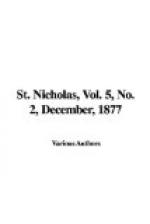The parrot nodded his head approvingly, as much as to say, “Right, quite right.”
The poor bird was very hungry, and I let him eat his fill.
Breakfast over, my guest flew upon my shoulder and was disposed to be affectionate. He delicately pecked at my lips, drew his bill gently across my cheeks, and pulled my hair with his claws.
“Come, come! friend Parrot, none of your soft billing and cooing. Leave that to women and children.”
So I gave my friend politely to understand that I did not care for such pretty endearments; and, soon comprehending the force of my objection, he very sensibly desisted from bestowing further attention upon me, and thenceforth kept his handsome person reasonably aloof.
I entertained my friend two days, during which I gave him much valuable advice, and, which was more to the purpose and perhaps better appreciated, plenty to eat.
On the morning of the third day, the sun rose in all his beauty again, and I fully expected the bird would fly away. He was in no hurry to go, however. I went out, wandered about, and toward noon returned home. Still the parrot was there. So it was the next day, and the next. I did not want to resort to force and drive him away.
Finally I said to him one day:
“Friend Parrot; since I see you are in no hurry to leave my humble home, and that it evidently grieves you to lose the pleasure of my society, I shall not eject you forcibly from the premises. Stay, therefore, as long as it shall please you. I will share with you food, and shelter from the sun and rain. And whenever you grow weary of this my society, tired of this plain habitation, or disgusted generally with civilization, and wish to return to the freedom of savage life, you are at liberty to go. ’Tis a large door, always open, out of which you can fly; and when you are gone I shall shed no tears over your departure.”
The bird seemed really to comprehend the drift of my discourse, and from that time forward we lived upon the most intimate terms, which, however, never passed the bounds of mutual respect.
Now, if we were to live in such close ties of friendship, it was necessary that my friend should have a name, and that he, too, should be able to address me by mine. The title, “Friend Parrot,” was rather too formal, and his screeching at me in some unmeaning way every time he wanted me could not for long be tolerated.
So, “Mr. Parrot” said I, “you are Mr. Parrot no longer. Your name is ‘Pippity.’”
He soon learned his new name, and then said I:
“Pippity! my name is ‘Frank.’”
It was incredible how rapidly he learned mine.
“Further, Pippity,” I continued, “you must learn the names of the things round about us.”
Instruction began at once. For several days he had to be told the names of things many times before he was able to repeat them correctly; but after that, and apparently all of a sudden, he seemed to have caught a bright idea and to thoroughly understand my method of teaching.




